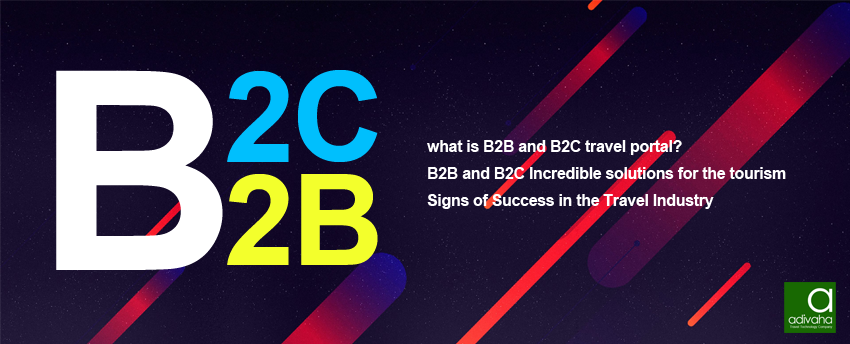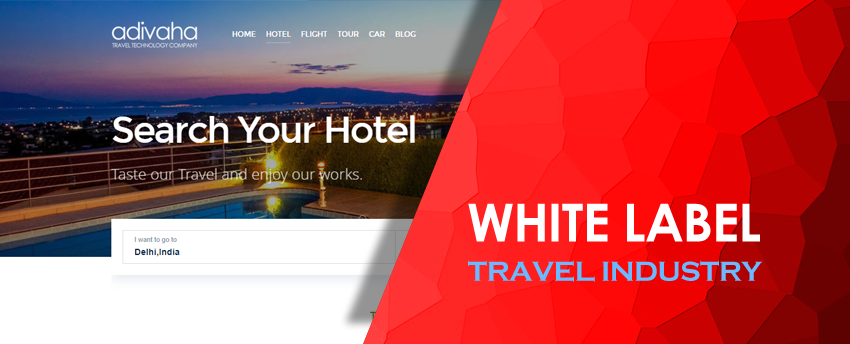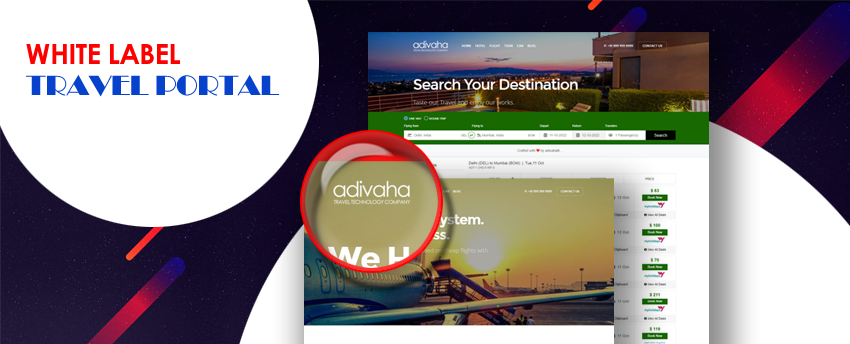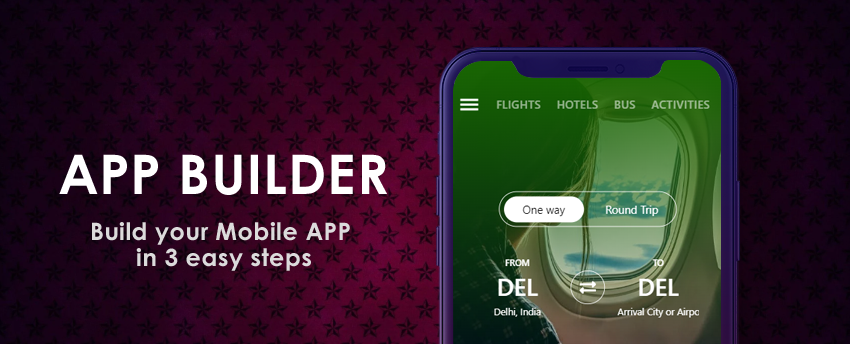-
What is B2B and B2C travel portal?
In this world of constant connectivity, the consumer is used to instant information. Travel companies must change and be more flexible to satisfy their customers’ needs. They have the tools to do this, and it’s an injustice if, using the latest technology in travel, they don’t use the advantages they have over competitors. B2B and B2C travel websites increase the profits for travel agencies by reaching worldwide clients.
The growth of technology in travel isn’t just limited to the planning of the trip. Technology is making a significant impact in making travel more accessible, more accessible, and more practical than ever before. Thanks to the advancement of modern technology, the whole landscape of travel is evolving. Today here we will learn about what is B2B and B2C travel portal?What are B2B and B2C?
B2B
B2B is the English acronym for business to business, whose literal translation would be from business to business. The B2B model refers to direct commercial operations between companies in which the final consumers are not involved. Among the most common examples of the B2B, model is wholesale, when a company sells raw materials to another or those businesses that are intermediaries between suppliers and end customers.
B2B is characterized, among other things, by the following:- Have a slow sales process since companies must analyze in depth the product or service they will buy.
- Obtain a higher average ticket than direct sales to the final consumer, despite having fewer customers.
- Being a model where long-term planning is crucial precisely because it has fewer customers than a B2C business, and loyalty becomes essential.
- Suppose you want to add this business model to your ecommerce. In that case, it is recommended that you strengthen business relationships with other brands and develop robust logistics to meet the needs of your corporate client.
B2C
The B2C model, for its part, refers to business to consumer, that is, from business to consumer. This includes online stores and marketplaces.
In this type of business, where the focus is on serving the end customer, it is important to keep in minding that:
- The sales process is expected to be quick and easy, so offering consumers an intuitive and secure platform to purchase without friction is necessary.
- Unlike the B2B model, the B2C model has a higher volume of customers, and the average ticket is usually lower.
- The results are more immediate than in B2B commerce, and stock and logistics become essential for customers to buy from you again and recommend you!
B2B and B2C Incredible solutions for the tourism
There are several options for online customer sales. On the one hand, there is B2B marketing, which consists of companies that do business with each other, and B2C (business to consumer), which refers to the strategies developed by companies to offer products or services to the consumer. That is, while in B2B, the end user is a company, B2C sells it directly to the consumer. The B2B marketing market is much smaller than the B2C market, but it has the advantage of access to talent that would normally be unattainable with the same budget. In addition, if the recipient is a company, the purchase decision is rational, made on needs and budgets. In contrast, when an end user is a person, the decision is much more impulsive and is based more on feelings than on the need. One of the sectors in which successful cases of B2B marketing can be observed is tourism. For example, a travel provider offers a consultation service to a travel agency. We are aware of this, and for this reason, we are committed to our Travel initiative, the software platform developed by the best technology company for managing companies in the tourism sector. B2B and B2C portal solutions allow the management of all the tourist product marketing processes, with a unit specifically dedicated to the needs of the tourism sector, offering a powerful B2B and B2C online sales module. For this reason, it is a management tool that may interest wholesalers and tourists, retailers and online agencies, reservation centers and hotel chains, and tourism and service companies. B2B and B2C solutions stand out for their ability to manage any product; it is integrated with more than 100 tourism product providers where agencies can search for availability and make reservations. It facilitates the process since the agencies do not have to carry out multiple searches on the pages of each of the providers. In addition, B2B and B2C solutions have the best technology of B2C travel portals. It is one of the tools used by India’s most important tour operators.
Let’s look at how B2C and B2B Travel Portals help your business:
Improved Communication
You’re mistaken if you believe your 9-7 evening call center is skilled in addressing your client’s needs. Customers nowadays require support and help 24 hours a day. If you serve an international audience, ensure it’s available according to their time zone. It is important to be considered this. What is the best way to provide to a worldwide audience? According to research, 148.3 million travel bookings are made online each year. Nowadays, consumers don’t understand why companies cannot answer their queries in minutes. The internet is an integral component of the lives of people today. Therefore, they must stop waiting for a call to change the room category or the date of departure. They must be able to react immediately to their customers. Through online portals for travel, you’ll be able to provide virtual assistance whenever visitors visit your website. Additionally, it can provide a lucrative return on investment by reducing the operating expenses of the call center.
Interactivity
The B2B and B2C portals for travel can help you use the practices established in our society today. Travelers are used to the practice of sharing their experiences and opinions online. Consider interactivity. Your customers are expressing themselves on the web, and you can easily embrace this trend to your company’s profit. If you’ve got an online presence, you could incorporate a contact form, testimonial area, and an online forum that can capture the views of your clients. 80percent of travelers spend between 4 and 6 weeks looking at other travelers’ reviews and researching destinations. What if your booking engine provided them with reviews or a discussion board?
Integration
We can integrate various interfaces and applications, including Global distribution systems. If you don’t have one, we can work without it.
Mobile engagement
It is possible to use the technology of location-based travel to monitor travelers during their journey and after travel to enhance customer service. Integrate social media with the experiences of your customers’ users from previous trips to anticipate their requirements and enhance your customer experience.
Payment Gateway Integration
Online bookings are made possible by seamlessly integrating payment methods on your travel site. The cashless payment method helps you and the customer book a reservation successfully on the internet since it’s easy to use.
Systems for reporting
It is possible to analyze and gain insights into your company’s progress. This will enable you to see crucial areas to improve and modify marketing strategies.
Keeps You Informed About Your Customers
An educated individual is more valuable than two. It’s also suitable for the travel business. Knowing your customers gives you a better likelihood of closing the sale. The B2B and B2C travel portals can help you analyze customer data. The user will get access to a variety of levels of data: who is visiting the website at what time, what goods are sought after and the way they are purchased, and what deters the potential buyer from buying a product or buying something, etc. This data is gold. It is possible to add services or plan your marketing using this information to convert potential customers to customers and increase loyalty with your existing customers.
Multiple Services
Price isn’t the only thing that guests look at before making a booking. Service is a close second. A travel site provides an enhanced and personal service to customers. It can assist the user throughout their journey during the booking, departure, and entire stay. Use these tips to encourage people to visit your website. This is why you need to transform your website into an effective information source for travelers.
Stay Ahead of the Competition
The technology of travel is climbing new levels. Traditional travel agencies are soon going to disappear into the past. In reality, an ordinary website won’t suffice. The tourism industry has begun to use cutting-edge technologies like Big Data and biometrics to give customers an unbeatable and secure experience.
The B2C and B2B Travel portals Are Signs of Success in the Travel Industry
The travel industry’s B2C and B2B sales landscapes have changed dramatically. The traditional brick-and-mortar travel agency was once a common feature of any commercial center. Travel agents cannot compete with online channels due to their unique offering of personalized customer support and counseling. Some large online aggregators make it difficult for smaller suppliers to compete. They promote a model where the price is the main product difference. Many smaller companies have responded to the pressure by investing in direct channels. Many hoteliers offer exclusive deals, including extras, through email marketing, social media, and online. Individual suppliers can control demand and differentiate their offerings while promoting direct bookings to increase their margins. One thing is certain in this evolving landscape: travel distribution will continue its evolution. Despite the many improvements in the industry’s operations, the customer is still the most important party. Online channels offer many options, but many customers still want the one-stop shop interaction that traditional travel agents provide. Although the number of online options, platforms, and aggregators can make it difficult for customers to find the right deal, many people are determined to get the best deal. How should the travel industry react? How can suppliers keep up to date with technological advances while meeting customer needs? These three key points will help companies adapt their B2C or B2B sales strategies.
The focus should be on customers and not on channels.
The previous distribution method was to make their offerings consistent over all the channels. Therefore, their offering will be identical for aggregators, agents, and direct channels. Recently, travel companies have realized that different segments of customers have different needs. For instance, certain clients will place the price over all other aspects. Others prefer customer service, while others are looking for special deals. So when a client base isn’t a homogenous one, then businesses are unable to provide the same process for booking. Therefore, businesses must move away from a channel-centric approach. Instead, they should put the customer at the center of their sales strategies, regardless of whether they are in B2B or B2C sales. Channel-centric thinking hinders flexibility. Instead of responding to customer needs and preferences, they focus on the market share goals for various channels. In contrast, a more customer-focused strategy encourages the development of a more flexible and flexible company strategy. Based on these facts, segmenting databases is the first step to creating a customized customer experience. Travel companies must be aware of their various customer segments and determine which channels are appropriate for the specific segments. From this point, the company must create the perfect booking experience, which is suited to the individual’s needs as well as their needs, wants, and goals. For example, value-driven tourists are attracted by similar and transparent booking experiences. On average, consumers looking for a bargain will look at about 3 to 4 websites before making a purchase. With these available numbers in mind, why would hotels, airlines or tour operators, and car rental firms not provide prices on their respective websites? While there’s the risk of losing customers, an open approach can earn trust and offers valuable insights into the preferences and behavior of customers.
Take the lead in the age of “big data.
The travel industry has access to massive amounts of information about customers gathered during a customer’s journey. The companies can determine everything from what the consumer was searching for when booking their flight, their preferred airline seats as well as the entertainment options in the flight, the use of credit cards to the basic information about their details. Data allows companies to build a complete image of their clients. Businesses can design marketing campaigns that connect with their client base more intimately. Yet despite the vast quantity of information that most companies can access, many of them cannot manage the data effectively. Businesses must learn to manage their data effectively in a highly competitive marketplace. Major companies such as Amazon and Google are making strides in the travel industry, using their expertise in using large data as an important tool in their arsenal. Google has recently purchased the airfare search company ITA. The acquisition has already allowed Google to offer users complete vacation itineraries with purchase hyperlinks. Smaller-scale businesses are moving slower. But there isn’t a complete loss. With the proper strategy, the right tools, and partnerships, hotel chains, and airlines can take on the competition. When they ask themselves what data is not being used, what data they might be collecting, and what capabilities they could enhance, smaller companies can be competitive on the battlefield of big data.
Learn to master the customer experience from beginning to end
The purchase isn’t the first step in the relationship between a business and its customers. It’s the contrary. The customer’s relationship with a business starts as soon as they recognize the company’s brand. The relationship also doesn’t end at an end-of-sale point. Every interaction after that provides an opportunity to establish trust and ensure future sales. The most important factor influencing customers’ experience is a complete understanding of their experience. To gain an overall view of the customer experience, a company must remove all obstacles that could block data flow across the business. Thus, a single data bank should be compared to different department storage facilities. Therefore, information about loyalty, prices, transactions, and even products should be maintained centrally, allowing information to be freely exchanged. To achieve this seamless and customer-centric model to business reality, companies should coordinate an effort across the organization to develop viable solutions for data sharing. Once data flows seamlessly throughout a company and is shared across the entire organization, it will not only enhance internal processes and processes but will also dramatically improve the customer experience across both B2B and B2C sales markets.
Conclusion
Above we have got all information about what is B2B and B2C travel portal? Travel companies must align with specific practices and, in the end, redefine their position. It’s their responsibility to improve their value, and B2B travel portals can be a great solution. In addition, owning a website is not an expensive financial investment, particularly when considering its return on investment. There are extremely low-cost open-source solutions, and all networks have solutions.
What’s required is to locate the most effective travel portal development firm to get an efficient and complete B2B or B2C portal. We at Adivaha are experts at designing travel portals suitable for SMEs and large companies. If you require a custom service or B2B or B2C white label travel portal, our team can assist you with solutions that meet your needs.
What is B2B and B2C Travel Portal? – Explained?
Recent Posts














Leave a Reply